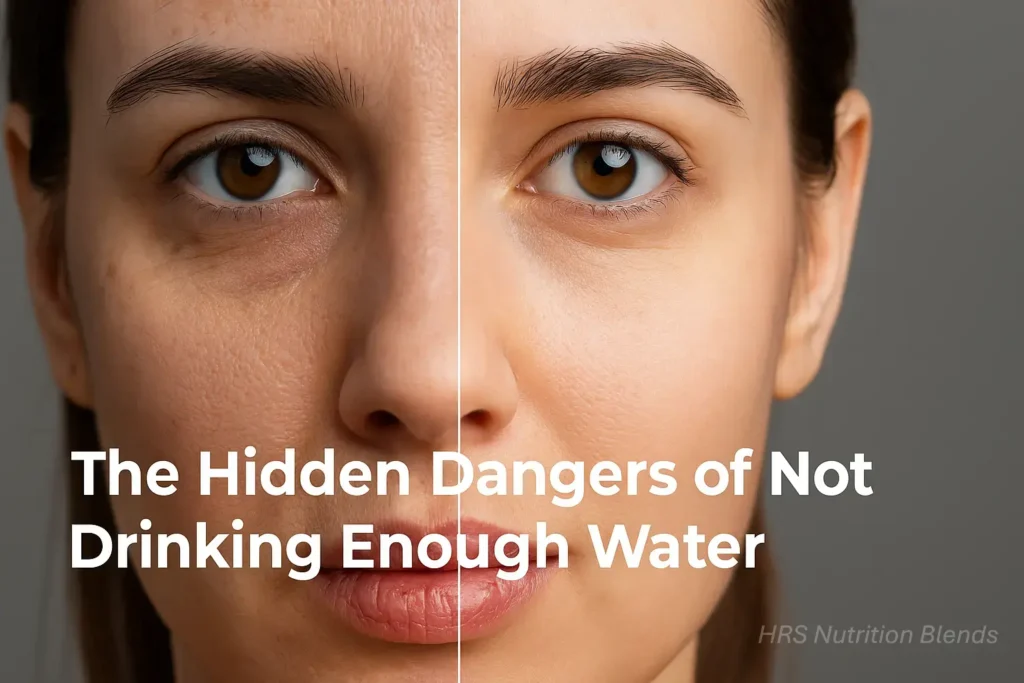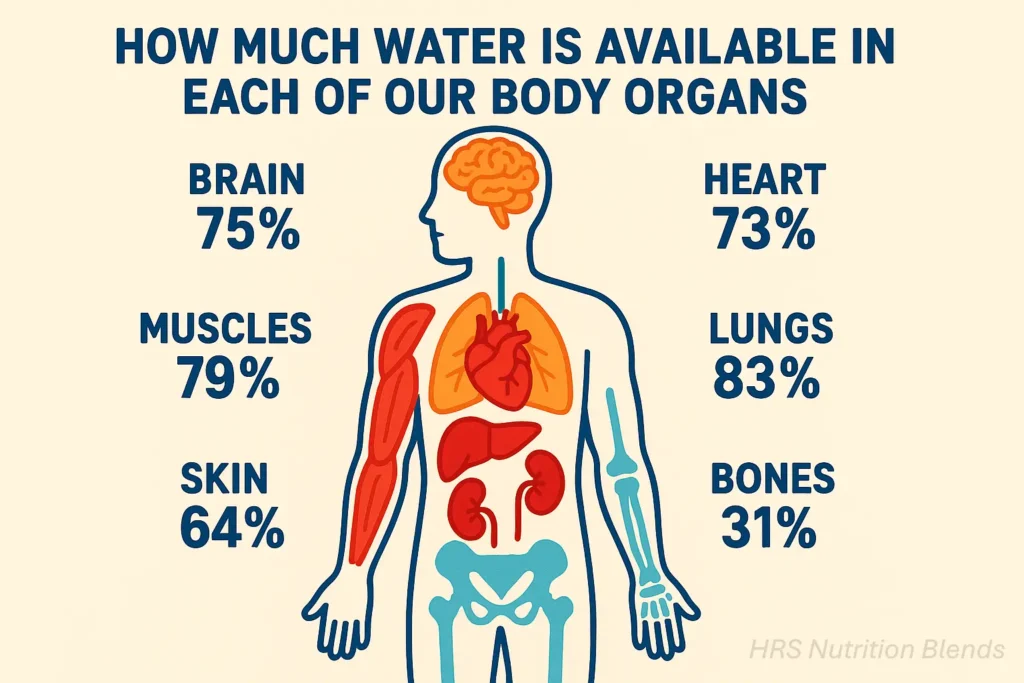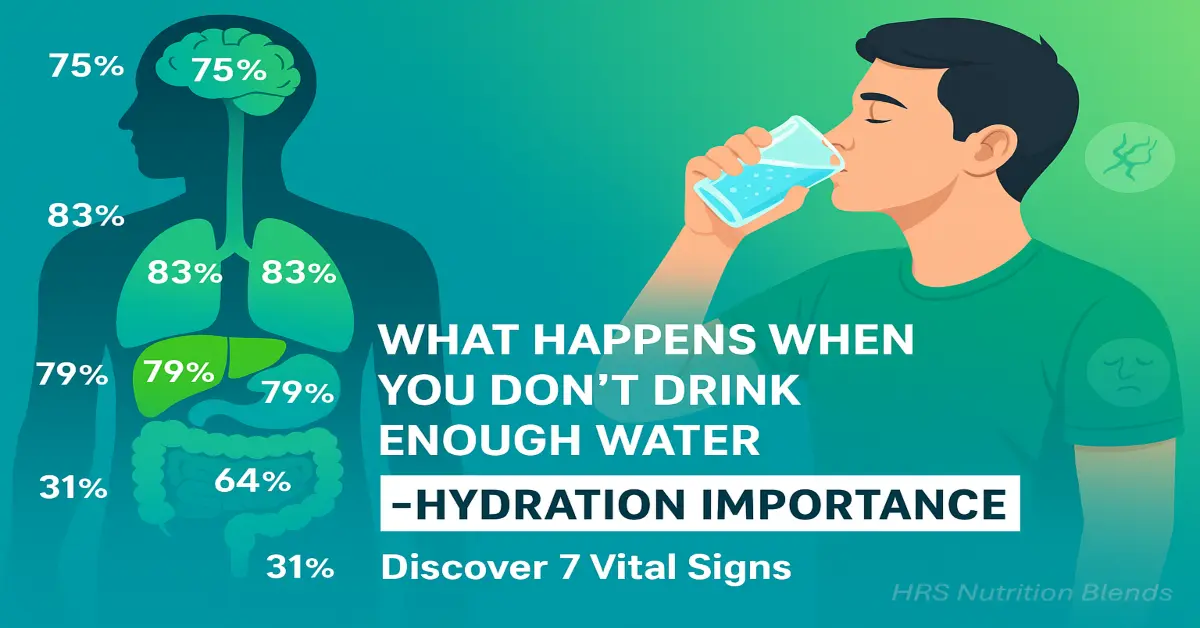Understanding hydration importance is crucial, as water keeps every cell in your body thriving, from powering your brain to flushing out toxins. Over the past five years, I’ve guided countless clients through the hidden dangers of dehydration, helping them reclaim energy and health with simple water habits. This post dives into what happens when you don’t drink enough, why hydration importance is a cornerstone of prevention, and practical steps to stay vibrant, drawing from my coaching experience and science-backed insights.
Why Hydration Importance Is Essential
Water is the foundation of life, making up about 60% of your body. It aids digestion, delivers nutrients, and keeps your skin radiant. The World Health Organization highlights that proper hydration supports overall wellness, a lesson I’ve seen transform my clients’ lives. Without it, your body faces a cascade of issues. I recommend 2–3 liters daily for adults, adjusted for activity and climate, based on years of tailoring plans.
Hydration importance goes beyond quenching thirst—it prevents headaches, lifts energy, and supports weight goals. A client, Anita, a 35-year-old office worker, struggled with midday slumps until we added water to her routine; now she thrives with renewed vigor, as detailed in my What Your Body Needs. Another client, a stay-at-home mom named Sunita, saw her skin improve after increasing her intake by one liter daily over a month. Making water a habit is a powerful step toward health, and I’ve seen it work for clients across age groups.
The Hidden Dangers of Not Drinking Enough Water
When you skip water, your body sends clear signals. Here’s what I’ve observed in my coaching and research:
- Dry Mouth and Thirst: A sticky mouth is your first warning. I’ve seen clients catch this early with my tips, like sipping water every hour during work.
- Fatigue: Energy fades fast. A busy dad I coached, working 10-hour shifts, felt drained until we boosted his intake to 2.5 liters daily.
- Headaches: Dehydration tightens your skull. Two glasses fixed this for a client I guided who spent long hours in the sun.
- Dizziness: Low water slows blood flow. A mom noticed this during hectic days with my help, especially in India’s heat.
- Dark Urine: Yellow or orange pee flags a need for water. I teach clients to check daily, per my Wellness Starter Guide.
- Constipation: Water eases digestion. A retiree I supported found relief with more fluids after weeks of discomfort.
- Skin Problems: Dryness or wrinkles creep in. Hydration keeps skin smooth, as I note in my Nutrition Checklist.
- Severe Risks: Long-term dehydration can damage kidneys or trigger heatstroke. Prevention is my focus, as I emphasize to all clients.

These effects underline why hydration importance is non-negotiable. Even mild dehydration—losing 1–2% of body water—disrupts focus and mood, a pattern I’ve helped clients like Anita and Sunita reverse with consistent water intake over weeks.
How Dehydration Impacts Your Body Systems
Dehydration affects every part of you. Here’s how, drawn from my five years of coaching:
- Brain: Water sharpens your mind. A student I mentored struggled in school until we added water breaks every class, improving her grades.
- Heart: Thick blood strains it. I’ve seen clients, including a 50-year-old teacher named Ravi, breathe easier with better hydration.
- Muscles: Cramps hit without water. A gym-goer I trained recovered with my advice after leg pains during workouts.
- Kidneys: They need water to filter waste. A client with a family history of kidney issues avoided problems with my guidance over six months.
Hydration importance safeguards these systems. I use a quick check—if you’re thirsty or urine is dark, drink up. My Daily Nutrition Guide offers more details on monitoring these signs daily.
Wait
5Early Warning Signs of Dehydration
Catching dehydration early is key. The table below lists signs to watch, as I advise my clients:
| Sign | What It Means | Action |
|---|---|---|
| Thirst | First hint, don’t wait. | Sip water now. |
| Dry Lips | Signal to hydrate. | Drink a glass. |
| Tiredness | Drained by noon? Check water. | Add 1–2 cups. |
| Confusion | Brain fog sets in. | Rest and hydrate. |
| Rapid Pulse | Body works harder. | Sip slowly, seek help if severe. |
I helped Priya, a busy mom, overcome confusion and fatigue by adding 2 liters daily. Hydration importance turns these signs around quickly, as I’ve seen with dozens of clients, including those with demanding schedules.
Who Needs Extra Hydration?
Some face higher risks, as I’ve learned through my work. The table below shows hydration needs by group:
| Group | Risk Factor | Recommended Intake | Tip from Coaching |
|---|---|---|---|
| Children | Lose water fast playing. | 1–2 liters | Set water reminders, as I guided a parent. |
| Seniors | Thirst weakens with age. | 2–3 liters | Add flavor, per a retiree’s plan. |
| Athletes | Sweat depletes them. | 3–4 liters | Use coconut water, as I advised a runner. |
| Ill People | Fever or diarrhea drains. | 2–3+ liters | Offer soups, as I helped a client. |
| Hot Regions (India) | Climate demands more. | 3–4 liters | Adjust with fruits, per my clients. |
Hydration importance is critical for these groups. I suggest coconut water or fruits, as in my Indian Diet Plan, and I’ve tailored plans for clients in humid areas like Chennai, adjusting for monsoon effects.
How Much Water Should You Drink?
Water needs differ, but here’s my coaching guide:
- Adults: 2–3 liters daily, more if active. I’ve seen clients in manual jobs need up to 4 liters in summer.
- Kids: 1–2 liters, by age, with active kids needing the higher end during play.
- Pregnant/Breastfeeding: 3–4 liters, as I recommend to expectant moms I coach for energy.
I calculate 30–40 ml per kg of body weight. A 60 kg person needs 1.8–2.4 liters. Use my BMR Calculator to find yours. Hydration importance rises with heat or exercise, and I adjust for clients based on their daily routines, like adding 500 ml for outdoor work.
Easy Habits to Stay Hydrated
Staying hydrated can be simple. Try these client-proven tips:
- Carry a Bottle: Keep water close. A salesman I coached adopted this during long commutes.
- Add Flavor: Use lemon or mint, no sugar. A kid I helped enjoyed it with cucumber slices.
- Eat Hydrating Foods: Cucumbers, oranges, and soups count. I include these in plans for variety.
- Set Reminders: Sip every hour. A nurse I guided used her phone during night shifts.
- Morning Boost: Start with a glass. Raj, a tech worker, felt the difference after a week.
Hydration importance grows with routine. My Meal Planning Templates weave water into meals, and I encourage clients to track intake for a month to build consistency.
Hydration’s Role in Your Goals
Water enhances your aims. Here’s how, from my coaching:
- Weight Loss: It reduces appetite. A client shed 3 kg with water before meals over two months.
- Energy: It fights tiredness. A mom I helped stayed active with three kids.
- Skin Health: Water brightens complexion. Priya saw this shift after 30 days of 2.5 liters.
- Digestion: It prevents constipation. An elder client improved after adding soups daily.
Hydration importance supports these wins. I connect it to plant-based eating in my Balanced Plate Guide, and I’ve seen clients maintain results long-term with my follow-up plans.
Busting Hydration Myths
Misconceptions confuse people. I clarify these:
- Myth: Only water hydrates.
- Truth: Fruits and teas work too, as I tell clients, with examples like watermelon.
- Myth: Thirst signals dehydration.
- Truth: It’s late. Drink ahead, per my advice, to stay proactive.
- Myth: More water is safer.
- Truth: Excess strains kidneys. Balance matters, as I coach with daily limits.
Hydration importance relies on truth. See my Nutrition Checklist for more, and I’ve corrected these myths for clients confused by fad diets or social media trends.
Steps to Recover from Dehydration
If you’re low on water, act promptly. My tips:
- Drink Slowly: Sip 2–3 cups over an hour. A client avoided dizziness this way after a hot day.
- Eat Hydrating Foods: Try watermelon or curd. I suggest this for kids during summer.
- Rest: Lie down if dizzy. A worker I coached recovered like this after a long shift.
- Get Help: See a doctor if severe (e.g., no urine). I stress prevention to avoid emergencies.
Hydration importance rebounds with action. My What Your Body Needs has recovery tips, and I’ve guided clients through mild dehydration episodes, like a teacher after a heatwave.
Long-Term Gains from Hydration
Hydration pays off over time. From my five years:
- Sharper Mind: Clients like Raj excel at work, reporting better focus after three months.
- Stronger Frame: Water supports muscles and joints, aiding a client with arthritis over a year.
- Reduced Risks: It may lower kidney stones, per World Health Organization, a benefit I’ve tracked with clients.
- Vibrant Living: My aim for all I coach, seen in improved energy levels after six weeks.
Hydration importance shapes a healthy future. Start now, as I guide in my Daily Nutrition Guide, with clients seeing sustained changes.
Hydration and Seasonal Changes
Seasonal shifts affect hydration importance. Here’s how I advise clients:
- Summer: India’s heat demands 3–4 liters. I recommend cucumbers and mint water, helping a client avoid heat exhaustion in Delhi.
- Monsoon: Humidity can mask dehydration. I suggest warm teas, as a farmer I coached stayed hydrated in Kerala.
- Winter: Dry air thickens blood. A retiree I guided drank herbal infusions daily in Punjab.
- Spring: Pollen increases thirst. I helped a client with allergies stay hydrated with fruits in Bangalore.
Adjusting water intake seasonally enhances hydration importance, and I tailor plans to India’s diverse climate, adding 500 ml during peak heat.
Hydration Myths Debunked in Detail
Let’s dive deeper into myths, with examples from my coaching:
- Myth: Coffee dehydrates you.
- Truth: Moderate coffee is fine, as I showed a client who drank it with water daily.
- Myth: You need 8 glasses daily.
- Truth: Needs vary, and I calculate based on weight, per my BMR Calculator.
- Myth: Thirst is enough to guide you.
- Truth: It’s unreliable, and I’ve corrected this for clients missing early signs.
- Myth: Sports drinks are always better.
- Truth: They’re unnecessary unless exercising hard, as I advised a runner.
Hydration importance thrives on facts, and I’ve spent years educating clients to avoid these pitfalls.
Daily Hydration Routines for Busy Lives
For busy schedules, I offer routines:
- Morning: Start with 500 ml. A teacher I coached felt alert by 9 AM.
- Midday: Sip 1 liter with lunch. A salesman stayed energized on routes.
- Evening: 500 ml with dinner. A nurse avoided night fatigue.
- Night: 200 ml before bed. A client improved sleep quality.
- Breaks: 250 ml every two hours. A software engineer I guided stayed focused.
Hydration importance fits any day. My Meal Planning Templates include these schedules, and I’ve seen clients adapt them easily, even with travel.
Hydration and Mental Health
Water impacts your mind, a focus in my coaching:
- Reduces Stress: A client with anxiety felt calmer with 2.5 liters daily.
- Boosts Mood: A teenager I helped saw less irritability after a month.
- Improves Focus: Raj, the tech worker, credited water for better concentration.
- Prevents Burnout: A doctor I coached avoided exhaustion with regular sips.
Hydration importance supports mental wellness, and I integrate this into plans, tracking client feedback over weeks.
Hydration Challenges in Modern Lifestyles
Modern life poses hurdles, but I’ve found solutions:
- Desk Jobs: Long sitting dries you out. I advise a 1-liter bottle, helping a banker.
- Screen Time: Eye strain worsens without water. A designer I coached added sips hourly.
- Fast Food: Salty meals dehydrate. I suggest water with meals, aiding a student.
- Travel: Planes dehydrate fast. A client flying often used my travel hydration kit.
Hydration importance overcomes these, and I customize strategies for clients’ lifestyles, ensuring consistency.
How Much Water Is Available in Each of Our Body Organs
Discover the water content in your body’s organs, highlighting hydration importance. This breakdown, based on scientific data, reveals why water is essential:
- Brain: About 75% water, critical for cognitive function.
- Heart: Around 73% water, vital for circulation.
- Lungs: Approximately 83% water, necessary for breathing.
- Muscles: Nearly 79% water, key for movement.
- Kidneys: Up to 79% water, essential for filtration.
- Skin: About 64% water, important for elasticity.
- Bones: Around 31% water, supporting structure.

This distribution underscores why hydration importance is vital for every organ’s health, making it a fascinating reason to prioritize water intake.
Common Questions(FAQ) on Hydration
What does hydration importance mean?
It’s water’s role in keeping you healthy, as I’ve taught for years.
How much water is ideal?
2–3 liters daily, more if active, via my BMR Calculator.
Does dehydration cause harm?
Yes, it leads to fatigue and more. Prevention is key, as I coach.
Which foods aid hydration?
Cucumbers and oranges do, as I include in plans.
Is water better than juice?
Yes, for health, but both help, per my tips.
Wrapping Up
Not drinking enough water impacts energy, skin, and health, as I’ve seen with clients like Priya and Raj. This guide reveals why hydration importance is vital and how to recover. Start with a glass today, explore my Wellness Starter Guide, and thrive with hydration!
Disclaimer: This is general wellness advice from my five years of coaching, not medical advice. It doesn’t diagnose, treat, cure, or prevent diseases. Hydration changes may not suit all, especially those with conditions. Consult a doctor before changes. I’m not liable for issues from this guide.
Next Read:
Macronutrients Made Simple
Resources:
- Meal Planning Templates.
- Nutrition Checklist.
- Wellness Starter Guide.
- What Your Body Needs.
- BMI Calculator.
- BMR Calculator.
- Water Intake Calculator.
- Protein Calculator.

I’m a passionate wellness coach with over 5 years of experience helping people build healthier lives through balanced nutrition and practical lifestyle habits. I focus on science-backed guidance, including whole foods, mindful eating, and smart protein choices, to support energy, digestion, and long-term well-being. My approach is flexible, realistic, and built on the belief that prevention is better than cure because lasting health starts with daily choices.

